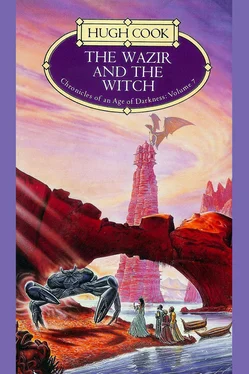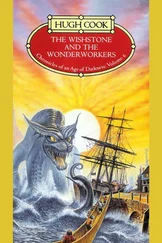Hugh Cook - The Wazir and the Witch
Здесь есть возможность читать онлайн «Hugh Cook - The Wazir and the Witch» весь текст электронной книги совершенно бесплатно (целиком полную версию без сокращений). В некоторых случаях можно слушать аудио, скачать через торрент в формате fb2 и присутствует краткое содержание. Жанр: Фэнтези, на английском языке. Описание произведения, (предисловие) а так же отзывы посетителей доступны на портале библиотеки ЛибКат.
- Название:The Wazir and the Witch
- Автор:
- Жанр:
- Год:неизвестен
- ISBN:нет данных
- Рейтинг книги:5 / 5. Голосов: 1
-
Избранное:Добавить в избранное
- Отзывы:
-
Ваша оценка:
- 100
- 1
- 2
- 3
- 4
- 5
The Wazir and the Witch: краткое содержание, описание и аннотация
Предлагаем к чтению аннотацию, описание, краткое содержание или предисловие (зависит от того, что написал сам автор книги «The Wazir and the Witch»). Если вы не нашли необходимую информацию о книге — напишите в комментариях, мы постараемся отыскать её.
The Wazir and the Witch — читать онлайн бесплатно полную книгу (весь текст) целиком
Ниже представлен текст книги, разбитый по страницам. Система сохранения места последней прочитанной страницы, позволяет с удобством читать онлайн бесплатно книгу «The Wazir and the Witch», без необходимости каждый раз заново искать на чём Вы остановились. Поставьте закладку, и сможете в любой момент перейти на страницу, на которой закончили чтение.
Интервал:
Закладка:
The great attraction of Qipty’s theories, and of Jing’s drummers, demons, rabid flying fish, killer worms and blood-sucking ghosts is that (always) the horror is generated by ‘the other’; by the abnormal presence, or influence, or trend; by something trespassing on the safe, kind, loving and lovable world of the ‘normal’.
In fact, the ‘normality’ which is posited by Qipty and Jing alike does not exist. Never has existed. Never will exist.
In proof of this, we need make no mention of the horrors of a world ruled by the threat of war; we need say nothing of the starvation which squalors in the backstreets behind prosperity’s mansions; we need make no mention of mortality, that great doom which threatens one and all with ultimate oblivion; we need say nothing of the cold wastelands between the stars and the heat-death of the universe which promises the destruction of all the works of man and woman alike.
We need make no mention of any of the above, for those who are alert to reality have realized the true horrors of everyday reality already; and it is a waste of time trying to convince the worshippers of ‘normality’ of the emptiness of their beliefs.
So, while ‘drumming’ truly existed on Untunchilamon, and while ‘drummers’ sometimes committed suicide, the realist will surely not join the eminent Yumbert Qipty in thinking the mere beating of drums to be the cause of adolescent self-destruction.
Rather, the realist will recognize that the world is a much harsher place than the self-deluded followers of the ‘normality’ cult would have us believe. Realists will recognize that it is very tough being an adolescent, and the problems of this age of life sometimes compound themselves to the point of causing suicide.
While it is difficult to be an adolescent, this fact is often obscured by another fact: namely, that it is exceptionally difficult (few things could be harder) to be a mature adult trying to deal with the insolence, foolishness, insensitivity and unconscious selfishness of children who are between the ages of thirteen and twenty-three. In despair, adults often seek a simple answer for the monstrous behaviour of such children, and find it comforting to pretend that it is abnormal, and to blame it on some simple external source of horror such as a ‘cult’.
But the fact is that every younger generation is destined to be a trial to the older generation. Thus it has always been, and always will be, though it is denied by professional myth-makers like Yumbert Qipty, he with his much-loved concept of ‘normality’. Qipty would have us believe that children ‘at the age of the blood’s turmoil’ (as the poet puts it) can be sane, rational, loving and law-abiding human beings. Qipty declares that in a ‘normal’ world, the young are polite, and considerate, and clean the dirt from beneath their fingernails without being told, abjure alcohol and other strong drugs, and unflinchingly cleave to truth, justice and the imperial way.
It is true that this desirable state of affairs has sometimes been obtained in certain closed societies where severe sanctions (not excepting banishment and death) are available for the chastisement of the young, and where adults unite to impose upon their progeny a degree of authoritarian control which even Aldarch the Third would envy. However, the strenuous nature of such social engineering is itself sufficient to refute the contention that the happy state of affairs thus obtained (a younger generation meek, quiet, obedient and fearful) is in any sense ‘normal’.
Rather, the realist recognizes that the young are by nature unruly and discontented; not least because they wish for the same freedoms their elders enjoy in the realms of action (and in sexual action in particular) but largely lack the means, money, skill, ability and power to make such wishes come true. This discontent expresses itself in many ways, with ‘drumming’ being but one such way; and one which arguably (though your sensationalist would have it otherwise) should not be greeted by hysterical fear on the part of their elders.
So, while this text does touch upon ‘drumming’ on occasion, please do not get the wrong idea. This is not a lurid assemblage of horrors designed to titillate and excite. Rather, this is a sober history which will proceed largely by careful analysis and exegesis, not by exclamation marks. Here you will find no gaudy tales of monsters and maidens; and, likewise, no breathbating stories of midnight raids, of cannibalism and torture, of blood-spouting torsos and amputated ears.
This — this is a work of scholarship, not to be confused with trite and trifling books about swords and slaughter, rapine and rape, battle and barrat. If you have an appetite for such, then you are advised to flee from the presence of these civilized pages, and find refuge from the world of reality in a romance like Chulman Puro’s famous magnum opus, The Bloodstained Dream.
In those pages of ill fame, you will be able to indulge your purile appetites by following at length the exploits of Vorn the Gladiator, who bellows his defiance to the world as he is driven into the Grand Arena at Dalar ken Halvar. A jeering crowd cheers for his destruction. But he is yet to be destroyed!
‘A hero’s weapon!’ he roars, holding aloft the great sword Zaftig.
Huge is that sword, a weapon too heavy for any mortal to lift from the sands. But Vorn the Gladiator bears its weight with ease; and, indeed, twirls it between two of his fingers as if it were a wieldy drumstick rather than a humungous weapon of murder.
Then the Great Gates of the Great Arena are opened, and the crowd screams for murder as a huge malatotha-pus lurches out on to the burning sands. The brute is a ghastly red. It is hideous to look upon, for it looks like an obscenely mutated Ebrell Islander grown to historic size, like the worst nightmares of prejudice made flesh. The thing is so huge that its shadow alone would crush any ordinary mortal to death.
But Vorn the Gladiator holds his ground.
The malatothapus advances.
The brave sword Zaftig gores the monster. But it sneers at the wound. Vorn is barely able to throw himself to one side to avoid his immediate extinction. Down to the burning sands he falls. He rolls sideways. Not away from the malatothapus but Under it!
He grabs at the brute’s testicles and fastens his teeth in its scrotal sac. Mad with rage and pain, the malatothapus charges the wall of the arena. It rams that wall, which is made of huge slabs of iridescent opal — wealth which is typical of Dalar ken Halvar, a city where the streets truly are paved with gold, and the buildings made of silver and ever-ice.
The slabs split, crack and crumble. Unfortunately, the ornamental chair which sustains the delicious rump of the Princess Nuboltipon is seated upon the uppermost of the slabs so destroyed. She falls screaming to the sands. She stands up, still screaming. Then she runs, fleeing across the burning sands like a common slave doomed to die for some unpardonable crime, like spilling soup over her master’s robes.
The malatothapus snorts with fury.
It starts after the Princess Nuboltipon.
Following behind is Vorn the Gladiator. His feet are braced upon the shield of a lesser warrior who died earlier in the day. He is clutching the short tail which waggles behind the malatothapus. Sand spurts out from either side of the shield as it furrows its way across the sands of the arena, as the tail-holding hero is dragged along by the monster.
The Princess Nuboltipon stops, for she can run no longer.
She turns.
She sees the malatothapus bearing down on her.
She screams.
The impact of her scream shatters every crystal wineglass brought to the Grand Arena by the wealthy members of the leisure class.
Читать дальшеИнтервал:
Закладка:
Похожие книги на «The Wazir and the Witch»
Представляем Вашему вниманию похожие книги на «The Wazir and the Witch» списком для выбора. Мы отобрали схожую по названию и смыслу литературу в надежде предоставить читателям больше вариантов отыскать новые, интересные, ещё непрочитанные произведения.
Обсуждение, отзывы о книге «The Wazir and the Witch» и просто собственные мнения читателей. Оставьте ваши комментарии, напишите, что Вы думаете о произведении, его смысле или главных героях. Укажите что конкретно понравилось, а что нет, и почему Вы так считаете.












